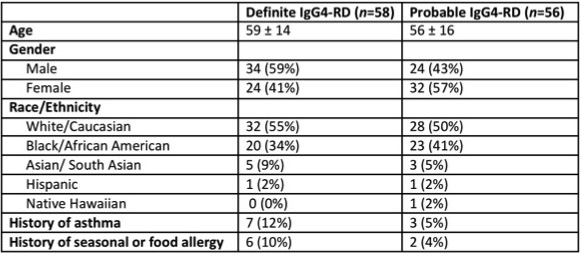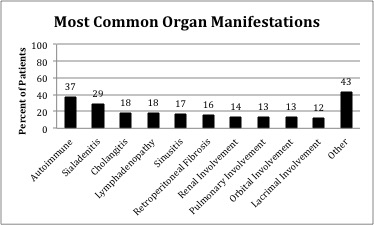Session Information
Date: Friday, November 6, 2020
Title: Miscellaneous Rheumatic & Inflammatory Diseases Poster I: Diagnosis and Testing
Session Type: Poster Session A
Session Time: 9:00AM-11:00AM
Background/Purpose: Immunoglobulin G4 Related Disease (IgG4-RD) is a fibroinflammatory condition that can involve almost any organ system. Diagnosis is made based on correlation of clinical, pathological and laboratory data. The 2019 American College of Rheumatology (ACR) / European League Against Rheumatism (EULAR) classification criteria for IgG4-RD were recently published to provide unified classification criteria in clinical research. The purpose of this study was to characterize demographics, disease attributes and treatments of patients referred to our specialized IgG4-RD clinic. We evaluated the performance of the new classification criteria on this cohort to understand its correlation to diagnosis.
Methods: This was a retrospective chart review of patients referred to the IgG4-RD clinic at Emory University Hospital from August 2013 through September 2020. Data collected include disease manifestations, histopathology, serological markers, and treatments used. Patients were categorized based on the clinician’s decision for diagnosis as: 1) definite, if they had typical clinical findings supported by histopathology or serology and diagnosed as IgG4-RD; 2) probable, if the diagnosis of IgG4-RD was still considered but could not be proven; 3) mimickers, if the patient was diagnosed as not having IgG4-RD. An ACR/EULAR classification criteria score was calculated to compare performance in these categories. The Emory University Institutional Review Board approved this study.
Results: A total of 198 patients referred to the Emory IgG4-RD clinic were evaluated. 84 (42%) were mimickers. Of the remaining 114, 58 (51%) were defined as definite and 56 (49%) as probable cases of IgG4-RD by treating clinicians. Patient demographics are shown in Table 1. Our cohort has the most representation of black patients with IgG4-RD in the published literature.
The most common organ systems affected are displayed in Figure 1. Pancreas was the most common at 37% of patients. Nearly half of patients had a less common (i.e. < 10% of patients) organ system involved. 61% of patients had multi-organ disease. Serology and treatments are shown in Table 2.
84% of patients with definite diagnosis were considered IgG4-RD based on classification criteria (i.e. score ≥ 20) with average score of 29 (range 4 -56). 9% in the probable category passed this threshold with an average score of 8 (range 0 – 31). None of the mimickers was classified as IgG4-RD based on classification criteria.
Conclusion: This study highlights that clinicians encounter many challenges in making a definitive diagnosis of IgG4-RD. In our cohort, 49% of patients fell into the category of probable diagnosis due to a lack of sufficient evidence to exclude or prove this condition. Patients with probable disease were treated similarly to those with definite disease and had similar rates of remission.
This is also the first study to evaluate the performance of ACR/EULAR IgG4-RD Classification Criteria in a single-center cohort. Patients with clinicopathological diagnosis of definite IgG4-RD largely met the scoring cutoff for diagnosis and mimickers did not, leaving the probable cases in a grey zone.
 Table 1. Demographics of patients with definite or probable IgG4-RD.
Table 1. Demographics of patients with definite or probable IgG4-RD.
 Table 2. Serology and treatment factors of patients with definite or probable IgG4-RD.
Table 2. Serology and treatment factors of patients with definite or probable IgG4-RD.
 Figure 1. Organ system involvement in all definite and probable IgG4-RD cases expressed as a percentage of all patients.
Figure 1. Organ system involvement in all definite and probable IgG4-RD cases expressed as a percentage of all patients.
To cite this abstract in AMA style:
Spandorfer R, Ahmad M, Khosroshahi A. Retrospective Analysis of Clinical Characteristics and Classification Criteria Performance in a Single Center Cohort of 114 Patients Diagnosed with IgG4-Related Disease [abstract]. Arthritis Rheumatol. 2020; 72 (suppl 10). https://acrabstracts.org/abstract/retrospective-analysis-of-clinical-characteristics-and-classification-criteria-performance-in-a-single-center-cohort-of-114-patients-diagnosed-with-igg4-related-disease/. Accessed .« Back to ACR Convergence 2020
ACR Meeting Abstracts - https://acrabstracts.org/abstract/retrospective-analysis-of-clinical-characteristics-and-classification-criteria-performance-in-a-single-center-cohort-of-114-patients-diagnosed-with-igg4-related-disease/
